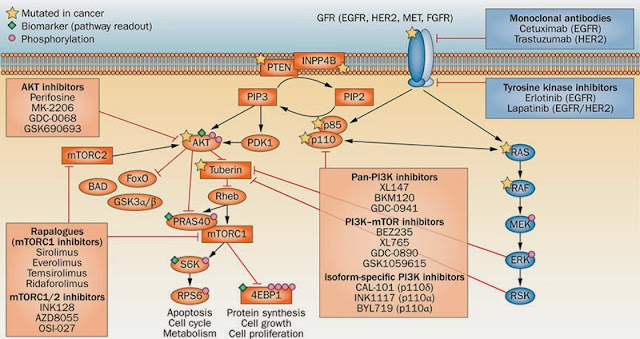Cancer types from leukemia to breast cancer, and bladder cancer to lung cancer are all driven by a common set of genes containing driver mutations. Researchers from The Cancer Genome Network (TCGN) sequenced and analyzed genomes of 3,281 tumors from 12 different cancer types and discovered 127 genes that were involved in the initiation or progression of these cancers. This research appears in the October 17, 2013, issue of the journal Nature.
- Breast adenocarcinoma (BRCA)
- Lung adenocarcinoma (LUAD)
- Lung squamous cell carcinoma (LUSC)
- Uterine corpus endometrial carcinoma (UCEC)
- Glioblastoma multiforme (GBM)
- Head and neck squamous cell carcinoma (HNSC)
- Colon and rectal carcinoma (COAD, READ)
- Bladder urothelial carcinoma (BLCA)
- Kidney renal clear cell carcinoma (KIRC)
- Ovarian serous carcinoma (OV)
- Acute myeloid leukaemia (LAML; conventionally called AML)
The club of 127
Most of the 127 genes indentifed as cancer drivers in this study belong to various signaling pathways or were involved in cell cycle regulation. Although not every cancer type had mutations in each of these 127 genes (as expected), there was a significant overlap and some genes are more likely to be mutated in a subset of cancer types. For example in the figure below, KRAS gene mutations were seen in 45% of colorectal cancers, 26% of lung adenocarcinomas and 20% of uterine carcinoma (see top right).
(Click here to see full size figure at the journal website)
Another example is PI3K signaling genes (also shown near the top right of the figure above) which were mutated in 10 of 12 cancer types tested, except ovarian and acute myeloid leukemia. PI3K/AKT signaling pathway has been in the cross-hairs of pharma drug development for some time, and as shown below there are many new drugs in development targeting this pathway. Many of these drugs are likely to benefit patients with many different cancer types.
Simple diagram of PI3K-Akt signaling pathway
(Source:Nat Rev Drug Disc. 2011;10:563. Fig. link)
Drugs under development targeting PI3K-Akt signaling pathway
(Source: Nat Rev Clin Oncol. March 2013;10:143. Fig link)
Narrowing the list of genes mutated in cancer to 127 has important implications. From targeted diagnostics to this small subset to redirecting and re-focusing drug development efforts against this gang of 127.
Signature mutations
Each cancer type still has its own signature mutation(s). For example, APC and MECOM were commonly mutated in colorectal cancers but not in other types (see figure below.) This type of information helps in making decisions regarding what should be the preferred first-line therapy for a particular cancer type.
(Click here for full size of figure at journal website)
Are we there yet
Speaking to the WSJ reporter, the senior author of this study, Li Ding of the Genome Institute at Washington University in St. Louis said:
"that with the new study, combined with plans by an international consortium to study even more cancers, ' I'm confident we are getting close to a complete list of cancer genes.' "-- Wall Street Journal, October 16, 2013 (link).
Related post
1000 Genomes, Clan Genomics and Cancer Biomarkers. September 30, 2011.
Kandoth C, McLellan MD, Vandin F, Ye K, Niu B, Lu C, Xie M, Zhang Q, McMichael JF, Wyczalkowski MA, Leiserson MD, Miller CA, Welch JS, Walter MJ, Wendl MC, Ley TJ, Wilson RK, Raphael BJ, & Ding L (2013). Mutational landscape and significance across 12 major cancer types. Nature, 502 (7471), 333-9 PMID: 24132290 (Free FullText)





Excellent post.
ReplyDelete